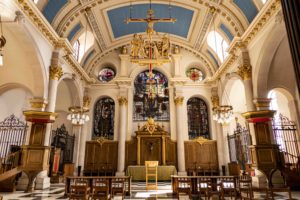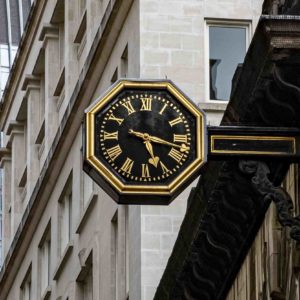Last weekend from 7-12 April the City was host to the Fragments Festival, a celebration of The Waste Land, a poem by T S Eliot that is rich in allusion to the streets and buildings of the Square Mile, which were well known to Eliot who was an employee of Lloyds bank. It is 100 years since the publication of The Waste Land, written in the shadow of WW1, and this month was the appropriate time to flow over London Bridge and enjoy the art inspired by the poem, with its famous opening, ‘April is the cruellest month …mixing memory and desire’.
The Fragments Festival organised by the T.S. Eliot Foundation was a rich blend of music and the spoken word – from gospel music to video installation, flamenco to poetry reading and discussions, and all in 15-minute chunks (what’s not to like). The idea was that you could pop from one venue to another, as most of the offerings were being presented on a loop on the half hour. Your day ticket allowed you to enjoy any of the performances on offer. With so much to choose from, it was perhaps not the easiest website to use and work out what was happening and when, but that was probably just me, certainly each venue was packed.
Some performances were closely linked to the text, like Ear to Ear in St Mary le Bow, a reading of the poem with a background of electro-acoustic music, some inspired by themes like water, sailors and the Thames. Folk singer Sam Lee played to a packed St James Garlickhythe (aren’t the City church names wonderful?) and the wonderful Portuguese Fado trio (traditional music which has its roots in the nostalgia of sailors for home) delighted at St Michael Paternoster Royal, (home to the much-needed Mission to Seafarers charity) performing haunting songs of lost love which left the audience genuinely moved and wanting more.

Set in the inexplicable splendour of 22 of our glorious City churches, the festival gave the chance to visit many churches that are not regularly open. The choice of venue was often worth looking at closely as well for example the Amies choir, for female survivors of human trafficking, performed at St Mary Woolnoth, where the abolitionist John Newton preached against slavery in the 18th century. Two of the venues were churches specifically mentioned in the poem – St Magnus the Martyr and St Mary Woolnoth (whose clock tells us it is time to start another less than exciting day when it strikes ‘the dead sound on the final stroke of nine’ ).

Since Billingsgate fish market was relocated in the 1980s, St Magnus Martyr no longer sits near fishermen lounging at noon, and instead hosted Toby Jones reading a selection of poems chosen by winners of the TS Eliot prize (for modern poetry). Some of the chosen poets were well-known, and some were very welcome new discoveries (for me anyway especially Robert Hayden).
The celebration was called Fragments, from the line in the poem ‘these fragments I have shored against my ruins’. This festival was creative, fun and eclectic with an extraordinary choice of offerings. I hope we see more similar events soon using the wonderful City locations in imaginative ways; I should have got the hang of the programme by then.
